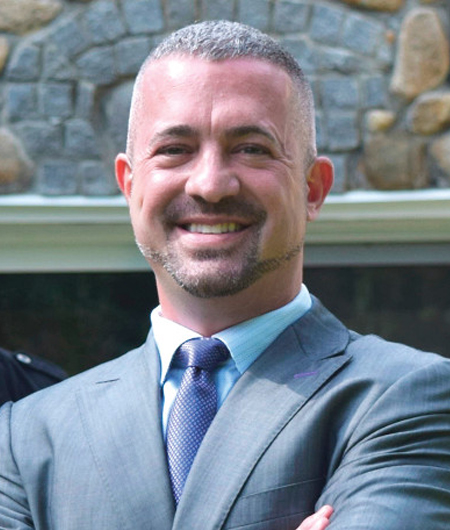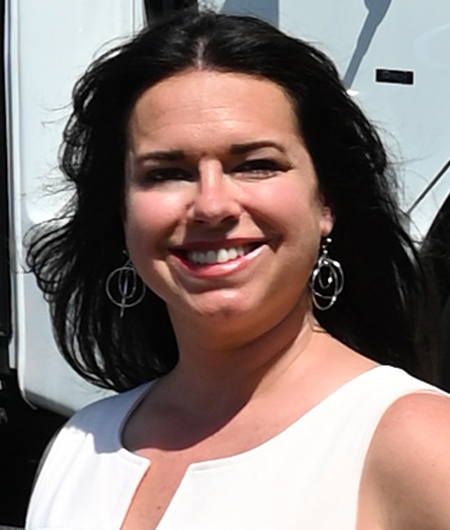When we featured Grace/Black Tie on our August 2022 cover, the team was in a period of transition as CEO Michael Campbell was focused on building the Amazon delivery service, JEI Logistics, that he had launched the year before. To relieve him of some of his responsibilities with his family-owned company, his longtime CFO Jessica Boulerice competently stepped into the role to oversee the financials as well as the daily operators—a Herculean task as the economy roared back to life. With the companies on smoother footing in a steadier economy, we caught up with the pair on what’s happening in their market, the trends they are following, and how they are preparing for a healthy 2024.
 CEO Michael Campbell
Chauffeur Driven: How have you settled into your roles?
CEO Michael Campbell
Chauffeur Driven: How have you settled into your roles?
Jessica Boulerice: We’ve actually switched things up recently. Mike is involved again with the operations since his skillset lends itself to sales and hiring, and he has been killing it. When I was overseeing both finance and operations, I didn’t have any time left at the end of the day. Now that operations are mostly off my plate, I’m focused on digging into the financial data and looking at trends—all the information that Mike needs to do his job like what positions to hire for next and the sales we’d like to build out. It’s splitting those operations responsibilities between us that has net us some significant gains in reducing farm-outs and increasing profitability.
 CFO Jessica Boulerice
CFO Jessica Boulerice
CD: Mike, what is it like balancing two time-consuming businesses?
Michael Campbell: Jessica still helps with operations when it’s a busy day for Amazon, but now that we’re more established, I’ve been able to delegate some of my Amazon duties to a few of my strong lead drivers, which frees me up to do interviews and sales for Grace. They’ve been a huge help, and it’s been manageable. I don’t have to take on dispatch for Amazon anymore, which really was the biggest piece of my time. Our station has been at maximum capacity with no signs of slowing down.
CD: What have been your biggest operations issues recently?
JB: Boston has had its challenges this year. The Sumner Tunnel, which goes to Logan Airport, was closed for two months this summer. The media whipped up a frenzy around it and there were signs encouraging people to take public transportation over driving, which impacted our numbers. Since the tunnel’s reopening in September, things are returning to normal, but what a crazy time.
MC: We were nervous that it might be the start of a recession, but with things back to where they need to be, we’re cautiously optimistic.
CD: Are you seeing any indicators that might point to a recession?
JB: Not necessarily, although growth is a little slower. Prior to 2020, we would have aimed for 10 percent growth year over year, but now it’s closer to 3-5 percent.
CD: Where are you seeing signs of optimism?
JB: Q1 was really strong for us, which was a huge relief since winters are typically slower for us. The labor market seems to be turning around, so that’s a good sign. The majority of chauffeurs that we’ve hired this year have worked out so far for us, which is a pleasant surprise.
CD: Besides the tunnel construction, have you had any other major challenges?
JB: Interest rates aren’t helping, and it’s definitely hurting small businesses the most. Unfortunately, many operators sold most of their fleets a few years ago and had to replace them at higher costs and triple the interest rates. Operators who used to be able to buy in cash are having a hard time because the price of the vehicle has gone up significantly. I don’t think interest rates are going to get much worse and might possibly get a little better if the Federal Reserve reduces rates in 2024, but buying vehicles this year wasn’t pretty. We don’t have any trouble getting financing but the rate to borrow is painful.
CD: What’s your biggest expense right now?
JB: Payroll. It’s significantly higher than it was in 2019, especially for chauffeurs and CDL drivers. We reviewed pay for all staff after we merged with Black Tie to make sure that it was even across the board, but salaries are up 20-25 percent since 2019.
CD: Are you making any changes to your fleet?
JB: We’ve gotten quite a few new vehicles this year. We didn’t sell during the pandemic, so we recently refreshed a bunch of our sedans and SUVs, sticking with the Volvo S90s and Lincoln Navigators, but we also leased a few new vans and bought a Sprinter. We’re thinking about a bus or two for next year since we’re training CDL drivers.
CD: How have you handled recruiting and hiring?
JB: Ten years ago we were able to recruit retired corporate folks to be chauffeurs, but now we need to attract younger people, which has proven to be a challenge. Applicants may not be accustomed to wearing a suit every day, but they are certainly hard working and trainable. We had to come to terms with the fact that they didn’t just show up ready to be a chauffeur; we have to put in that effort to teach them.
MC: I’m pretty quick about calling people and being persistent about moving them through the pipeline, but I think that our image of ourselves was a bit lofty in the past. We used to pass on Uber and Lyft drivers, even if they presented well, but we’ve found that they can be great chauffeurs. The suit is the easy part—we’ll take care of that if needed. We also changed our ads to ‘driver’ instead of ‘chauffeur’ since that’s what people are searching for, which has helped. They usually think delivery or Uber when they see an ad for a driver, so having those conversations and explaining the job has helped immensely. This can be a good job for younger people; we just have to sell it better.
CD: Have you increased your office staff as well?
JB: We’re about the same level as last summer. Our trip count is still lower than before COVID, but because we’ve been able to increase our rates, our profits have been steady or rising.
CD: What are your strongest market segments of late?
JB: It’s seasonal. Corporate travel falls off a bit in the summer just as weddings pick up. In the fall, we’re crazy busy with both, plus sports. We feel that corporate travel will be back to pre-pandemic levels by next year, especially with people returning to the office. Last year was probably the best period for weddings since the ‘80s. It’s slowed down a bit, but they’re still booking. Now many are booking bigger vehicles like buses and motorcoaches.
We did become a certified training center for CDL drivers, which wasn’t a difficult process since our chauffeur manager had so much experience as a CDL driver and trainer. It’s been less than a year, but a few of our existing drivers upgraded their CDLs so that they could drive our motorcoaches with a few new hires and some other staff who are in the process now.
CD: What financial advice would you give to other operators right now?
JB: Margins are still as tight as they’ve ever been, so I think it’s important to keep a close eye on the data. We’re looking especially at productivity and seeing what reservationists and dispatchers are handling now compared to pre-COVID. Since things were slow for so long, it’s easy to feel overwhelmed now that it’s picked up significantly. We’re being careful not to schedule too much downtime with chauffeurs—flight schedules have not been friendly to our industry. We’ll have 20 trips all scheduled for the morning and then a two-hour lull of nothing. We’re at the mercy of the airlines, so we all have to pay attention to these things since the business is changing and doesn’t run the same as it did even 5 years ago.
CD: What are you forecasting for 2024?
JB: We hired a new marketing team this year to help us focus more on selling new customers and accounts that are using the type of business that we want to sell. Not that we’ll ever stop doing airport runs, but we really want to pursue bus and specialty work, if only for reliability and predictability. The airlines being as messy and complex as they are right now just adds to that extra level of hassle that none of us can do anything about.
We’ve all had to relearn how to roll with the highs and lows in recent years, and that persistence is key. Grace has been through big economic events in the past, so we’re of the mindset that we’ve been through this before and we can get through it again, but it’s good for everyone’s resiliency to have that reminder. [CD1023]
Q&A With Michael Campbell and Jessica Boulerice of Grace/Black Tie Limousine
- Details

